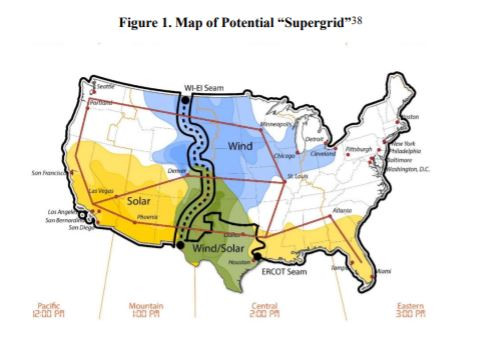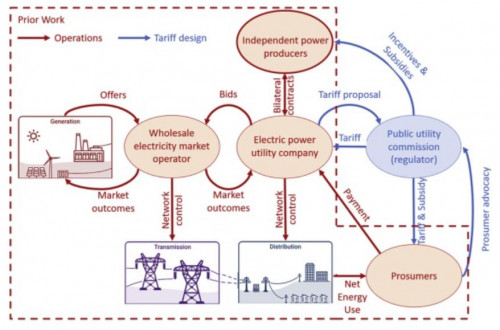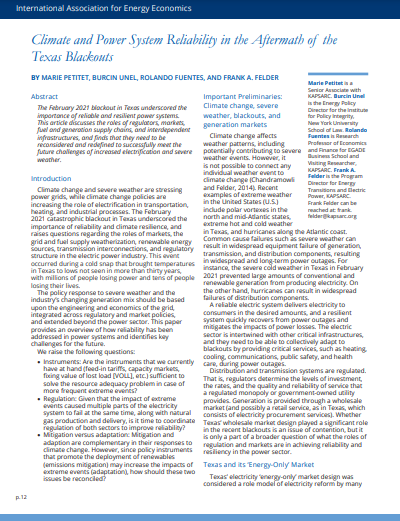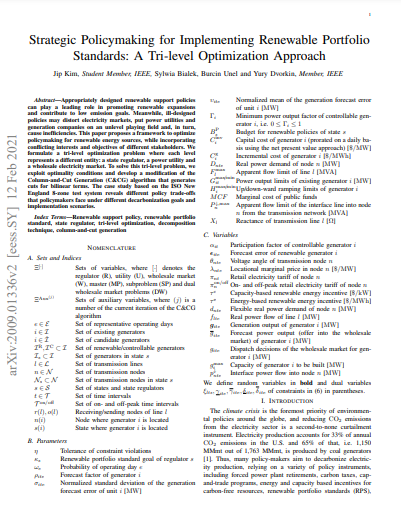-
Building a New Grid without New Legislation: A Path to Revitalizing Federal Transmission Authorities
Published Ecology Law Quarterly
In the absence of legislation, critical long-distance transmission can be developed by applying existing federal legal authorities. A number of important regulatory and commercial measures have been proposed, including streamlining transmission planning, upgrading existing transmission system components, putting transmission lines underground, and using existing rights-of-way from highways and railroads. Even if these solutions are adopted, however, state siting requirements may prove an important obstacle to developing an efficient, national transmission grid. So, this paper examines legal authorities already available to the Department of Energy and the Federal Energy Regulatory Commission to develop the interstate transmission capacity crucial to the energy transition.
-
Comments to FERC on Evangeline Pass Expansion Project
We filed a comment letter with the Federal Energy Regulatory Commission (FERC) regarding their continued failures to meaningfully assess the climate impacts of natural gas infrastructure projects, this time regarding the Evangeline Pass Expansion Project EIS. Two companies have requested authorization to construct and operate a new pipeline, compressor stations and meter stations in Louisiana and Mississippi, which will be used to transport up to 1,100,000 dekatherms per day to an LNG facility for export. -
Modeling Strategic Objectives and Behavior in the Transition of the Energy Sector to Inform Policymaking
in The Electricity Journal
The typical starting point and centerpiece of energy decarbonization is the electric power sector, a large direct GHG emitter. Published in The Electricity Journal, this paper explores what the modeling community should do to inform this transition, including expanding energy market datasets and designing models that incorporate multiple objectives and manifold actors behaving strategically in a framework consisting of large uncertainty, while accounting for the physics of power systems.
-
Climate and Power System Reliability in the Aftermath of the Texas Blackouts
The February 2021 blackout in Texas underscored the importance of reliable and resilient power systems. This article discusses the roles of regulators, markets, fuel and generation supply chains, and interdependent infrastructures, and finds that they need to be reconsidered and redefined to successfully meet the future challenges of increased electrification and severe weather
-
Comments to New York PSC on Climate Change Vulnerability Assessments
We submitted comments to the New York Public Service Commission to voice our support for a petition concerning the impacts of climate change on utility infrastructure. Our comments emphasize that it is imperative for public utilities to identify and assess the risks that climate change poses to their assets and operations.
-
Comments to NYISO on Buyer-Side Mitigation Reforms
In a recent presentation, the New York Independent System Operator (NYISO) posed key questions related to potential buyer-side mitigation reforms. We submitted comments that provide three recommendations to NYISO.
-
Comments to New Jersey on Solar Incentives
The New Jersey Board of Public Utilities (BPU) released a straw proposal for its Solar Successor Program. We submitted comments addressing a question about solar projects' potential benefits to environmental justice (EJ) communities. Our comments encourage BPU to consider the inclusion of an environmental justice adder and reommend that BPU explore an adder that would deliver material benefits to EJ communities.
-
Comments to DOE on Process Rule for New Energy Conservation Standards
The Department of Energy proposed revisions to its procedures and policies for considering new energy conservation standards across a range of consumer products and commercial equipment. We submitted comments offering support for the proposed revisions and making additional recommendations. Our recommendations include weighing a full range of environmental and consumer effects, incorporating the consideration of distributional justice, and reviewing the selection of discount rates.
-
Comments to Maryland PSC on Energy Storage Report
The Maryland Public Service Commission requested input on its working group's energy storage report. We submitted comments in support of several of the working group's recommendations. We also encourage the Commission to apply the same principles that inform the report to assess the net emissions impacts of energy storage installations.
-
Strategic Policymaking for Implementing Renewable Portfolio Standards: A Tri-level Optimization Approach
Forthcoming
Appropriately designed renewable support policies can play a leading role in promoting renewable expansions and contribute to low emission goals. Meanwhile, ill-designed policies may distort electricity markets, put power utilities and generation companies on an unlevel playing field and, in turn, cause inefficiencies. This paper, forthcoming in IEEE Transactions on Power Systems, proposes a framework to optimize policymaking for renewable energy sources, while incorporating conflicting interests and objectives of different stakeholders.
Viewing recent projects in Electricity







